Agents on the U.S. border have always had more leniency when it comes to searching people’s belongings. After Trump’s immigration ban was announced in late January, reports circulated that travelers’ personal digital devices were increasingly getting searched when they tried to enter the country.
In response to those stories, Sen. Ron Wyden from Oregon introduced a bill that, among other things, would require Customs and Border Protection to get a warrant before searching travelers’ digital devices.
Back in February, he asked the Department of Homeland Security questions regarding this issue and then followed up with CBP. Now it looks like CBP might be changing some of its ways.
On July 12, NBC published a document—dated June 20—that said CBP looks only at what’s physically on a laptop, smartphone, tablet, or other device. According to the document, agents don’t use travelers’ personal devices to look at information stored on the cloud during checks.
The release appears to be a response to Sen. Wyden’s questions to the agency.
On July 17, the Electronic Frontier Foundation, a digital rights group, published its thoughts about the new information. It reported that this represents a change from CBP’s 2009 policy, which “does not prohibit border agents from using those devices to search travelers’ cloud content,” but instead allows agents to search information they find at the border. The EFF interpreted the 2009 rules to mean agents were allowed to look at cloud content.
Border Patrol agents have certainly taken advantage of the vagueness of the previous policy.
In November 2015, BuzzFeed reported the story of a journalist who was detained before a flight to Miami. Police reportedly looked through his phone and data, including emails with sources and intimate photos.
And then came the immigration ban. In January 2017, Megan Yegani, an immigration lawyer, tweeted about Border Patrol checks: “US Border patrol is deciding reentry for green card holders on a case by case basis - questions abt political views, chking facebook, etc.” Her tweet went viral.
In February 2017, the Associated Press reported that the American Civil Liberties Union and the EFF “have noticed an uptick in complaints about searches of digital devices by border agents.” But the AP also said that the numbers were on the rise before Trump was inaugurated: the number of electronic media searches increased to 23,877 in 2016 from 4,764 in 2015
The EFF seems pleased with this recent announcement, but it’s also being a little cautious.
“EFF will monitor whether actual CBP practice lives up to this salutary new policy. To help ensure that border agents follow it, CBP should publish it,” the organization wrote.
As a next step, the EFF would like CBP to release information about how often it conducts searches for other agencies and to tell the public whether agents actually advise travelers that they have a right not to tell a border agent the passwords to their devices.
